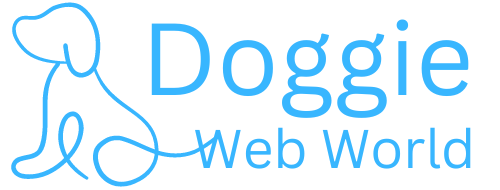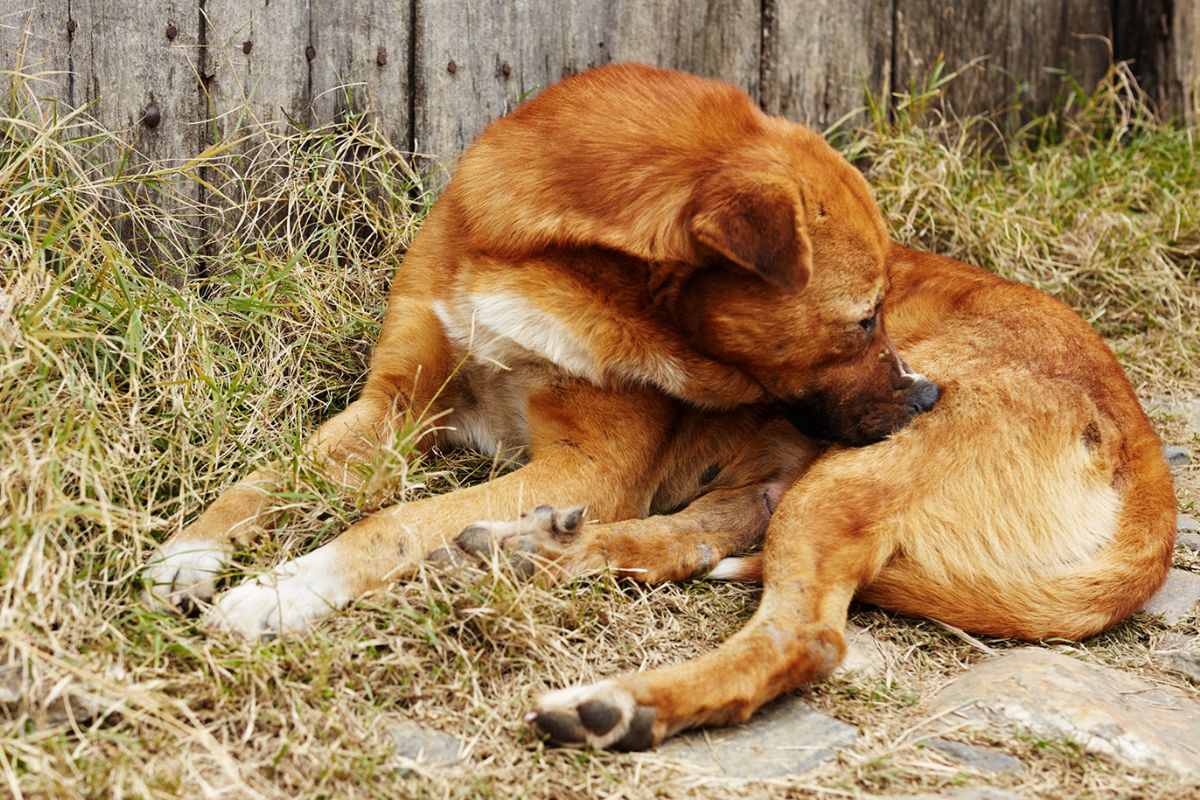Have you ever had an itch you just couldn’t stop scratching? It can be maddening! Well, it happens to our dogs as well! You may have noticed your dog chewing the fur off their back. There are several reasons why this may happen, ranging from a regular old itch to more serious health conditions. Let’s explore some of the most common reasons along with what you need to know (or do) to help your pooch.

Why is Your Dog Chewing the Fur Off His Back? Here are the10 Most Common Reasons
Before we dive in, just a gentle reminder: It is always important to consult a veterinarian if you have any concerns about your dog’s health.
1. Parasites (Fleas, Ticks, Mites, Etc)
Fleas, ticks, mites, and other external parasites can cause intense itching and discomfort. We know, we know, it is so gross, but it is a part of having pets. And we need to keep pests off our pets.
Bites are uncomfortable. Your dog will chew at their fur to relieve the irritation. Some pets can even be allergic to the bites making the discomfort even worse.
Regular flea prevention is crucial to keep your dog free from fleas. Keep your living environment clean and free from pests by vacuuming, washing bedding, and using pest control methods.
Remember that prevention is often easier and more effective than treating a full-blown infestation or parasite-related health issue.
Side note, if you’re looking for inexpensive places to buy flea preventatives, check out our review of the 8 Best Online Pet Pharmacies For Dog Meds

2. Skin Infections
Skin infections are relatively common in dogs and can be caused by various factors, including bacteria, fungi, and yeast. They often lead to itching and discomfort, causing your dog to chew at the affected area. Hot spots, which are moist, inflamed areas of skin, are a common example.
Depending on the type of infection, your vet might prescribe antibacterial, antifungal, or anti-yeast topical treatments. Early intervention and proper treatment are key to resolving the issue. And as always, prevention is the best thing.
One thing that can help is “5 Dog Dandruff Home Remedies to Get Relief from Itchy Skin.” There are some great tips in there (not just for dog dandruff). Check it out.
3. Stress or Anxiety
Some dogs may chew their fur as a compulsive behavior in response to stress or anxiety. Dogs can experience stress and anxiety for various reasons…even dogs that live a life of luxury. It is important for their well-being that these issues are recognized and addressed.
Dogs may also excessively groom themselves as a response to stress or anxiety. This can present itself as chewing the fur off their back. This could be anxiety.
Check with your vet to see what your options are for helping your stressed pooch. And try to provide a designated area where your dog can retreat to when feeling anxious. Also, regular physical activity can help alleviate stress and anxiety.

4. Boredom
Dogs are naturally curious and energetic animals that require regular engagement through play, exercise, and interaction with their environment and humans. When these needs are not met, boredom sets in, leading to frustration and stress. As a coping mechanism, dogs may start to chew on their fur to relieve boredom and the discomfort of inactivity.
This is another issue that is made better by physical activity through daily walks, playtime, and interactive games. The amount of exercise needed varies by breed and age. Addressing boredom not only prevents unwanted behaviors but also contributes to your dog’s overall happiness and well-being.
Consider buying Fido a few great interactive dog toys or an automatic ball launcher like the iRetriever for those times when you can’t be there to help relieve his boredom.

5. Pain
Underlying pain, such as joint discomfort, can lead to excessive grooming and fur chewing. Dogs may focus on areas like the back where they can reach easily.
It’s difficult to see your dog in pain, and understanding and addressing their pain is crucial for their well-being.
Pain in dogs can stem from various sources, including injuries, illnesses, aging, and underlying health conditions. Excessive licking or biting at a specific area can indicate localized pain. If you suspect your dog is in pain, consult a veterinarian.
Remember that the best approach is to work closely with your veterinarian. They can provide tailored advice and treatment options based on your dog’s individual needs and the underlying cause of their pain. You just want to make sure you address the pain to give your dog some relief.
I also recommend checking out our PetsPEMF review over on TechnoBark. PEMF, which stands for Pulsed Electromagnetic Field Therapy, is a non-invasive way to relieve pain from arthritis, hip dysplasia, injuries, and more.

6. Hormonal Imbalances
Hormonal issues can affect a dog’s normal coat and skin health and can lead to fur chewing. Hormonal imbalances in dogs can lead to various health issues and behavioral changes. Hormones are chemical messengers that regulate numerous physiological processes in the body.
When these hormones are out of balance, it can result in a range of symptoms and health problems. This is another issue you really want to talk about with your veterinarian. Hormonal imbalances can be very disruptive.
7. Allergies
Like humans, dogs can be allergic to a myriad of different things, from pollen to fleas to food. Regardless of the cause, allergies can lead to numerous uncomfortable symptoms, including the urge to chew off the fur on their back.
Fur-chewing due to allergies also has a psychological component. The constant itchiness and discomfort can cause significant distress and anxiety in dogs, affecting their overall well-being and behavior. In their attempt to soothe the itch, dogs may become fixated on chewing their fur, which can spiral into a compulsive behavior if the underlying allergy is not addressed. This can lead to a vicious cycle where the skin’s condition worsens, making the dog even more uncomfortable and inclined to chew, thereby maintaining or even escalating the severity of their symptoms.
To prevent and treat fur-chewing behavior caused by allergies, it is crucial to identify and manage the underlying allergic triggers. A veterinarian will perform a thorough examination to determine the source of the issue. This might involve conducting allergy tests, modifying your dog’s diet to eliminate potential food allergens, improving environmental conditions, or using flea control products.
Your vet may also recommend an antihistamine to help alleviate the symptoms and break the cycle of itching and chewing. Regular grooming and skin care can help maintain your dog’s coat and skin health, reducing the likelihood of allergic reactions.
8. Food Allergies
Yes, this is an allergy too but specifically a food allergy. Food allergies can manifest as skin issues, causing itching and fur chewing. Changing your dog’s diet under veterinary guidance might help alleviate the problem.
Food allergies in dogs occur when their immune system reacts negatively to specific ingredients in their diet. These allergic reactions can lead to a variety of symptoms and discomfort. It’s important to distinguish food allergies from food sensitivities, which involve non-immune responses to certain ingredients.
It’s important to remember that diagnosing food allergies can be complex, and it may take time to identify the specific triggers. Work closely with your veterinarian to develop an appropriate diagnostic and management plan for your dog’s unique needs.
Check this out for diet recommendations: The Best Hypoallergenic Dog Food for Itchy Skin.
9. Autoimmune Disorders
Some autoimmune disorders can affect a dog’s skin, leading to irritation, inflammation, and excessive grooming. Autoimmune disorders in dogs occur when the immune system mistakenly targets and attacks the body’s own cells, tissues, or organs. These disorders can lead to a wide range of symptoms and health issues.
It’s important to work closely with a veterinarian if you suspect your dog has an autoimmune disorder. These are common and difficult to pinpoint. A proper diagnosis and treatment plan tailored to your dog’s specific condition is crucial for managing the disorder and improving your dog’s quality of life.
10. Eczema
Our last one is its own category because it doesn’t really fit in any of the other categories. Eczema is an inflammatory skin disease that affects about 10-30 percent of the human population and about 3-10 percent of dogs are also affected.
Eczema is relapsing but non-contagious. There was a study titled, “Gene Associated with Eczema in Dogs Identified” that explored a specific gene that affects dogs with eczema. Eczema in dogs can definitely lead to chew their fur.
As you have heard before, this is something you want to contact your vet about. There is systemic treatment and local treatment. And your vet will determine the best course of action.
You can also considering giving your dog a good CBD supplement (like Vet Naturals Hemp & Hips Plus CBD). Check out the video below to learn why:
Conclusion
Remember, each dog is unique, and the exact cause can vary based on factors such as breed, age, and overall health. The act of your dog chewing his fur off his back is likely indicative of an underlying issue that requires attention and care. It could be a result of various factors such as allergies, parasites, anxiety, boredom, or even a medical condition.
It can be unnerving to see your dog chew their own body so much that they lose their fur. However, hopefully knowing more and more about why can make it feel like something you can handle. Mostly you want your dog to be okay.
As a responsible pet owner, it is essential to consult a veterinarian to determine the exact cause and develop an appropriate treatment plan. By addressing the root cause and providing the necessary support, you can ensure the well-being and comfort of your beloved furry companion. This ultimately helps foster a healthier and happier life for your dog.
Have you seen your dog chewing the fur off his or her back? Has it been extreme? We would love to hear your experiences.


